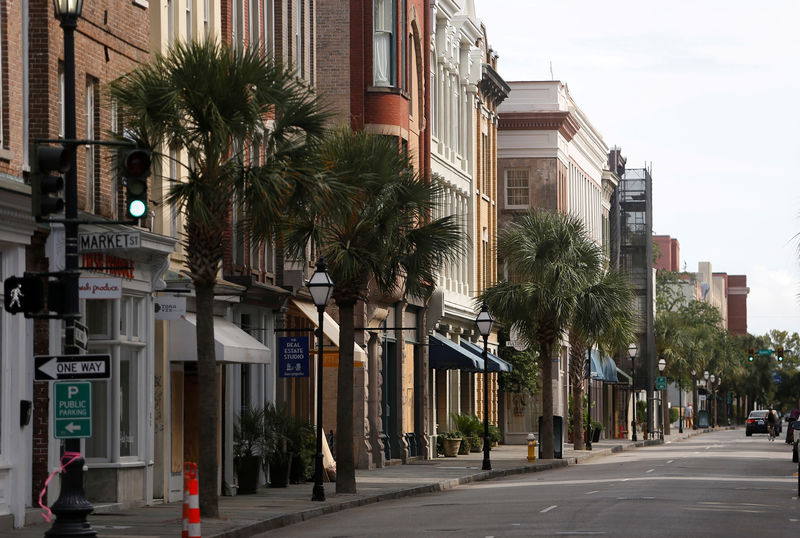By Howard Schneider
ST. LOUIS (Reuters) - The view from Wall Street may be all trade wars, tariffs and uncertainty these days, but ask a Main Street banker and things are pretty darn good.
Americans are building and buying homes, small businesses are borrowing, and families are earning and spending money. Even the seemingly stressed U.S. farm sector, which has borne the brunt of the fallout from the Trump administration's trade battle with China, is holding its own financially, with steady land prices backing the loans needed to stay in business.
It's an outlook that contrasts with the brooding about recession that has driven U.S. bond yields to near historic lows in recent weeks, and caused stock markets to wobble with each trade threat from the White House. Even with markets diving another 2% on Wednesday and the World Trade Organization slashing estimates of global trade growth, the mood here remained firm.
Federal Reserve officials have "continually made the point that the economy is on a strong footing. Employment is strong. The household sector is strong," said Michael Stevens, senior executive vice president of the Conference of State Bank Supervisors, the local regulators who oversee the roughly 5,500 banks with less than $10 billion in assets. Most have less than $250 million.
"When you get down to that local level – I see consistency" with the Fed's view of a continued, household-driven expansion, Stevens said in an interview at the sidelines of a conference on community banking hosted by the St. Louis Fed.
Since the spring the CSBS has rolled out a new sentiment index built on surveys of more than 500 community bankers from across the country. The first set of results, in June, showed "an overall positive outlook," with large majorities of those surveyed expecting stable or improved business conditions and profit.
A second reading was just recently released, covering a volatile summer when President Donald Trump threatened to order American companies to leave China, and compared the chairman of the Federal Reserve, Jerome Powell, to a communist adversary of the United States.
The outlook was unchanged.
With a steady migration of people to Texas, "we see the positive - people moving out to our part of the state, building homes," said Tom Sellers, president of Alliance Bank in Sulphur Springs, Texas, outside Dallas. "There is still a lot of construction, commercial and residential," that is more than offsetting a steady consolidation in the dairy industry that used to be more important to the bank's business, he said.
Despite the trade war and other risks, "I am still pretty optimistic about where we are," Sellers said.
DILEMMA FOR THE FED
The survey results shed light on the dilemma facing the Federal Reserve as it tries to understand whether strong household spending will continue, or be sapped if a slowdown in manufacturing and global trade starts to weigh on hiring and wage growth.
The risks seem truly scary, with the world's main economic actors seeming to have turned away from cooperation and toward conflict and central bankers admitting they may not be of much help going forward.
For some at an annual central bank conference here, the situation is less than rosy, a reminder that disruptions, like the trade conflict, do not hit all communities in the same way.
"All signs for us are pointing to a recession," said Kish Bank president Gregory Hayes, who noted that small business lending in his rural Pennsylvania area flattened in May and has yet to recover.
That was around the time Trump threatened to raise tariffs on Mexico over an immigration dispute, an event which jolted Fed officials in their analysis of economic risks.
"On the small business side it is across the board. It is that project that maybe they are going to hold off on, or that expansion they are going to hold off on," he said. "Where there was just a ton of demand...we went flat."
Nationally, yearly growth in bank commercial and industrial lending has fallen by about half since April, from an annualized rate of 10% to around 5% - one possible impact of a slowdown in manufacturing and a decline in global trade flows.
But the U.S. economy remains dominated by services and consumer spending, and the largely upbeat attitude here may show how buffered many parts of the United States are from the trade war that dominates debate in Washington.
Regardless of what tariffs Trump has slapped on Chinese imports, or what retaliation China has taken, it remains the case that those people moving to Texas will all need a place to live, as well as grocery stores, barbershops, mechanics, and all the other services that follow population.
That can fuel a whole portfolio of loans for a local bank. And that is a dynamic that can last as long as jobs continue to expand and wages to grow.
"We have a booming, robust economic situation," said Julieann Thurlow, president of Reading Cooperative Bank in Reading, Massachusetts, near Boston.

She said the mood may be different in a city dependent on global exports and tradeables. But around Boston it is "really a service economy and a tech economy and education," she said. "There is low unemployment...There is huge demand for housing."